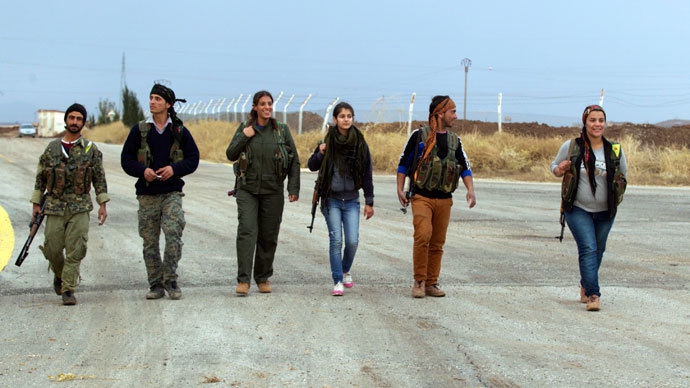 Members of the Kurdish People's Protection Units (YPG) walk together in Al-Rmelan, Qamshli province November 11, 2013.(Reuters / Stringer)[/caption]
Members of the Kurdish People's Protection Units (YPG) walk together in Al-Rmelan, Qamshli province November 11, 2013.(Reuters / Stringer)[/caption]Syrian Kurds declared an autonomous provincial government in the country�s northern territory on Tuesday, according to reports. The move comes ahead of the Geneva 2 peace talks, in which they will not have direct representation.
A municipal council will run the territory�s affairs from one of three administrative districts. The body - The Ciz�re Canton of West (Syrian) Kurdistan - will have its own president and 22 ministries, including foreign affairs, defense, justice and education. Kurdish, Arab, and Assyrian representatives will be appointed to each ministry. Kurdish, Arabic, and Syriac have been designated as the canton�s official languages. Elections will be held in four months, Reuters reported, citing the Britain-based Syrian Observatory for Human Rights.
Kurds have used the confusion and chaos of the Syrian civil war as an opportunity to assert more control over the northeastern area of the country.
The announcement came following a meeting of the Legislative Assembly of the Democratic Autonomous Government of Western Kurdistan,��attended by all members of the Assembly which is made up of 52 parties, civil society organizations, youth and women�s movements and 15 independent individuals,� Firat news agency reported.
The formulation of an autonomous governmental body follows requests - which were ultimatelydenied - for a Kurdish�delegation�at the Geneva 2 peace talks in Switzerland, separate from the Syrian government and opposition.
The dominant political party in Kurdish Syria, the Democratic Union Party (PYD), blamed regional powers like Saudi Arabia and Turkey, as well as the United States, for blocking its attempts to take part in the convention, which seeks to smooth tensions between warring factions fighting in the country.
In Syria, Kurds make up around one-tenth of the population, and have suffered repression for decades. Since the outbreak of civil war in 2011, Kurds have largely had to fight on their own, as President Bashar Assad�s government has focused on fighting against militants and Islamist groups.
Some Kurdish parties will attend the Geneva talks as entities of the Western-backed National Coalition, though the PYD rejected adhering to any resolutions that are reached in Switzerland.
The talks, set to begin Wednesday, have been preceded by acrimony following a rescinded United Nations invitation to Iran and evidence that appears to implicate the Syrian government in the torture and killing of thousands of detainees.
The PYD is allied with the Kurdistan Workers� Party (PKK), which has criticized the peace talks for being a choice between two evils for Kurds. The PKK has fought Turkey for over three decades, leading to the deaths of 40,000 people.
"At a time when all sides are being invited to the conference, the Kurds' demand for participation has been overlooked," the PKK said in a recent statement.
The Syrian opposition's �attitude is no different from that of the (President Assad�s) Baath regime. They don't take seriously the demands of the Kurdish people, just like Turkey's attitude."
The PKK likened the Geneva 2 conference to the Treaty of Lausanne in 1923, which is responsible for the modern Iran, Turkey, Iraq and Syria borders, leaving Kurds� ethnic homeland splintered among the four countries.
Kurds �lived one century suffering the outcomes of Lausanne," the statement said. "Therefore, they will not allow Geneva 2 to be another Lausanne for them."
For thousands of years the majority of Kurds have lived in the so-called Kurdistan Region, an area along the border of four Middle Eastern countries � Turkey, Syria, Iraq and Iran. The Kurdish population in the region is around 40 million, making Kurds one of the world's largest ethnic groups without its own state.
By Russia Today
The Iran Project is not responsible for the content of quoted articles.











